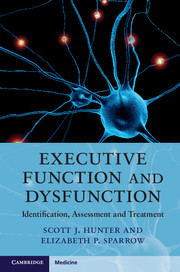Book contents
- Frontmatter
- Contents
- Editor biographies
- List of Contributors
- Preface
- Acknowledgments
- Introduction
- Section I Foundations of Executive Function/Dysfunction
- Section II Executive Dysfunction in the Neurodevelopmental and Acquired Disorders
- Introduction to Section II
- Chapter 5 Executive functions in disruptive behavior disorders
- Chapter 6 Executive functions in autism spectrum disorders
- Chapter 7 Executive functions in intellectual disability syndromes
- Chapter 8 Executive functions in pediatric movement and motor control disorders
- Chapter 9 Executive functions in learning disorders
- Chapter 10 Executive functions in mood and anxiety disorders
- Chapter 11 Executive functions in childhood epilepsy
- Chapter 12 Executive functions in pediatric cancer
- Chapter 13 Executive functions in HIV
- Chapter 14 Executive functions and neurotoxic exposure
- Chapter 15 Executive functions after congenital and prenatal insults
- Chapter 16 Executive functions in acquired brain injury
- Section III Applications
- Appendix 1 Abbreviations used in the book
- Appendix 2 Tests/tasks referenced in the book
- Index
- References
Chapter 14 - Executive functions and neurotoxic exposure
from Section II - Executive Dysfunction in the Neurodevelopmental and Acquired Disorders
Published online by Cambridge University Press: 05 October 2012
- Frontmatter
- Contents
- Editor biographies
- List of Contributors
- Preface
- Acknowledgments
- Introduction
- Section I Foundations of Executive Function/Dysfunction
- Section II Executive Dysfunction in the Neurodevelopmental and Acquired Disorders
- Introduction to Section II
- Chapter 5 Executive functions in disruptive behavior disorders
- Chapter 6 Executive functions in autism spectrum disorders
- Chapter 7 Executive functions in intellectual disability syndromes
- Chapter 8 Executive functions in pediatric movement and motor control disorders
- Chapter 9 Executive functions in learning disorders
- Chapter 10 Executive functions in mood and anxiety disorders
- Chapter 11 Executive functions in childhood epilepsy
- Chapter 12 Executive functions in pediatric cancer
- Chapter 13 Executive functions in HIV
- Chapter 14 Executive functions and neurotoxic exposure
- Chapter 15 Executive functions after congenital and prenatal insults
- Chapter 16 Executive functions in acquired brain injury
- Section III Applications
- Appendix 1 Abbreviations used in the book
- Appendix 2 Tests/tasks referenced in the book
- Index
- References
Summary
Neurotoxicity refers to adverse alteration of CNS functioning due to exposure to either a natural or manmade substance. The impact of neurotoxic exposures on development can be quite significant, given both the underlying vulnerabilities of the maturing brain and the potential for early neurotoxic exposures to alter a child's developmental trajectory. This chapter reviews the relationship between the most commonly encountered neurotoxins and EF in children and adolescents. We will begin with a review of environmental neurotoxins (lead, PCBs, manganese, and pesticides), followed by a discussion of substances of abuse. This will include prenatal exposures to teratogens, and the impact of voluntary consumption of alcohol, marijuana, and cocaine during adolescence.
Environmental neurotoxins
The effects of environmental neurotoxins are undoubtedly multifaceted and bidirectional, with numerous variables contributing to ultimate outcomes. From a methodological perspective, this has resulted in an increasing appreciation of variables including maternal education, nutrition, and other high risk environmental variables which are more likely to co-exist in an environment with neurotoxins. A full summary of the literature, particularly in regards to lead and related SES variables, is extensive and beyond the scope of this chapter. The review below is intended to be succinct and focused on EdF associated with environmental neurotoxins in childhood.
Information
- Type
- Chapter
- Information
- Executive Function and DysfunctionIdentification, Assessment and Treatment, pp. 174 - 190Publisher: Cambridge University PressPrint publication year: 2012
